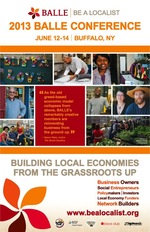
Kick-off June 11, 2013- An evening with Judy Wicks
By Jay Burney
The BALLE (Business Alliance for a Local Living Economy) Conference got off to a big start in Buffalo last night as Hallwalls Contemporary Arts Center hosted an evening with Judy Wicks, co-founder of BALLE. Wicks spent the evening discussing her new book Good Morning Beautiful Business, as a part of the "Get the Rust Out" Speaker Series.
BALLE is about developing local economies and Wicks story is both archetypical and inspiring for the aspiring entrepreneur and localism activist. In 1970, after a stint as VISTA volunteers Wicks and her then husband Richard Hayne, both 23, took their combined $3,000 of VISTA pay-out and started a small store in a declining Philadelphia neighborhood. It was called the Free People’s Store. “What we thought at the time” Wicks told the 75 or so people at Hallwalls, “was that you buy something at a certain cost, and sell it for a little more.” They sold products associated with the under 30 crowd including new and used clothing, candles houseplants, and “hip housewares.” That first year was full of challenges. It wasn’t as simple as buy low sell high. She told the story about how at one point she wanted to buy 12 pairs of satin bell-bottomed jeans that were the most expensive products they had purchased. She bought 6, sold a few pairs, and bought some more. “One day a group of high-school kids from the neighborhood came in, distracted me, and ran out of the store with one of them wearing a new pair of my satin bell-bottoms. I ran out the door, locked up the shop and chased her down, tackled her, and took the jeans off, leaving her in the middle of the street in her underwear. I got the jeans back, that’s what mattered to me.”
The two lived in a small apartment behind the store “which helped keep the costs down” said Wicks. But within a year the couple divorced. Hayne changed the name of the store to “Urban Outfitters” and today remains CEO and President of the well-known chain that today has a net worth of almost $2 billion. He is one of the richest people in the world. A few years later, Wicks started a restaurant called the White Dog Café, which catered to a healthy foods, localist clientele. “We believed in humanely treated food resources such as free range animals, local farms, and fair trade coffee, chocolate, and tea.” Wicks told the crowd. The restaurant, located on Sansom Street in Philadelphia was in a building originally slated for demolition for a new mall. Wicks rallied the neighbors and the restaurant became a hotbed for progressive activism and localism. Speakers including Amy Goodman, Lester Brown, Helen Caldicott, and others helped focus the community on issues ranging from local engagement, health, environment, and the evils of corporate globalization. “These view differed significantly from her former husband,” she told us. The restaurant became a huge success, and the neighborhood was saved from the mall developer. She was able to buy her building and invest in the neighborhood, expand, and move into other entrepreneurial businesses. She was asked to join the Social Venture Network by Ben Cohen of Ben and Jerry’s Ice Cream. SVN expanded into international support for localist and self-reliant businesses in Chiapas Mexico, Cuba, and Vietnam among other places. One thing that bothered her was that even the socially responsible businesses relied on the old model of economics, which promoted growth as the predominant paradigm. Grow or Die, she told the audience, that was the model. “I was more interested in social value beyond the dollar bottom line.” Soon Ben and Jerry’s, Odwalla Juices, Stoneyfield Farms, and Toms of Maine, SVN leaders and icons of the social venture movement were bought out by multi-national corporations.
Eventually she helped to co-found BALLE and has inspired countless people to consider business as a vehicle for social change. Buy her book, available today at local bookstores for more details.
The question and answer session provided several enlightening exchanges. One woman asked if her success in the Sanson Street neighborhood created an opportunity for “gentrification.” It was hard to dodge that question, and Wicks did not. “If you invest in a neighborhood, make it more livable, property values will increase.” Wicks declared.
How did you avoid “Grow or die” asked another woman in the audience. “I decided not to franchise, and instead invested in or started other business’s” she said. Today I am retired and living mostly off rental income from the Philadelphia properties.
Another question: “Can you identify one secret to your success?” Wicks responded quickly- “I lived upstairs from the store, and then restaurant, lived and worked in the same neighborhood, grew my kids there, and that saved a lot of time because I didn’t have to commute.” Indeed.
Links:
BALLE Home Page
2013 BALLE Conference Buffalo NY
Buffalo First, local BALLE Sponsor
 RSS Feed
RSS Feed